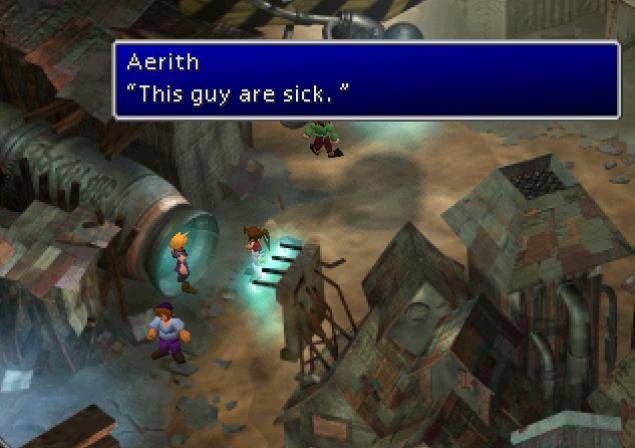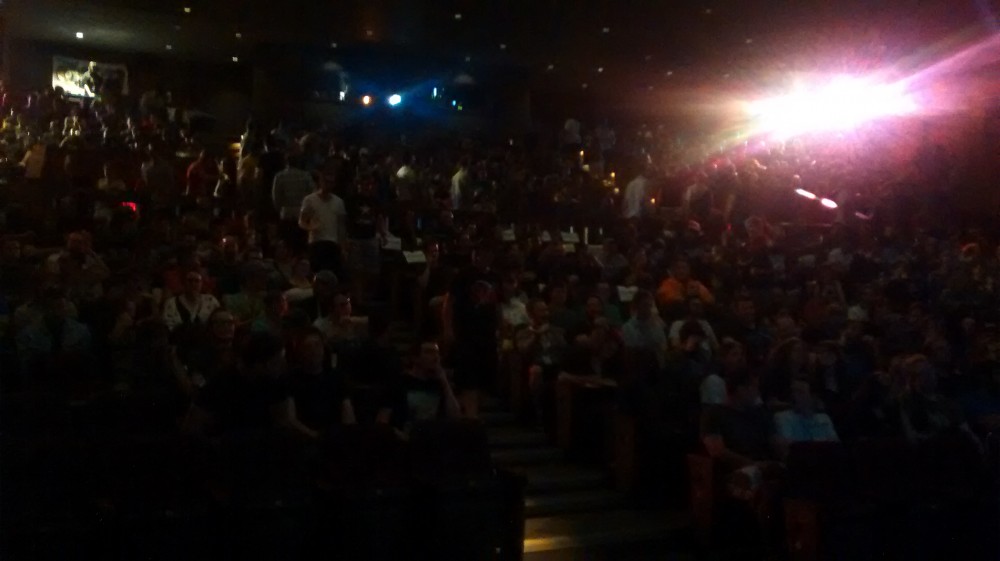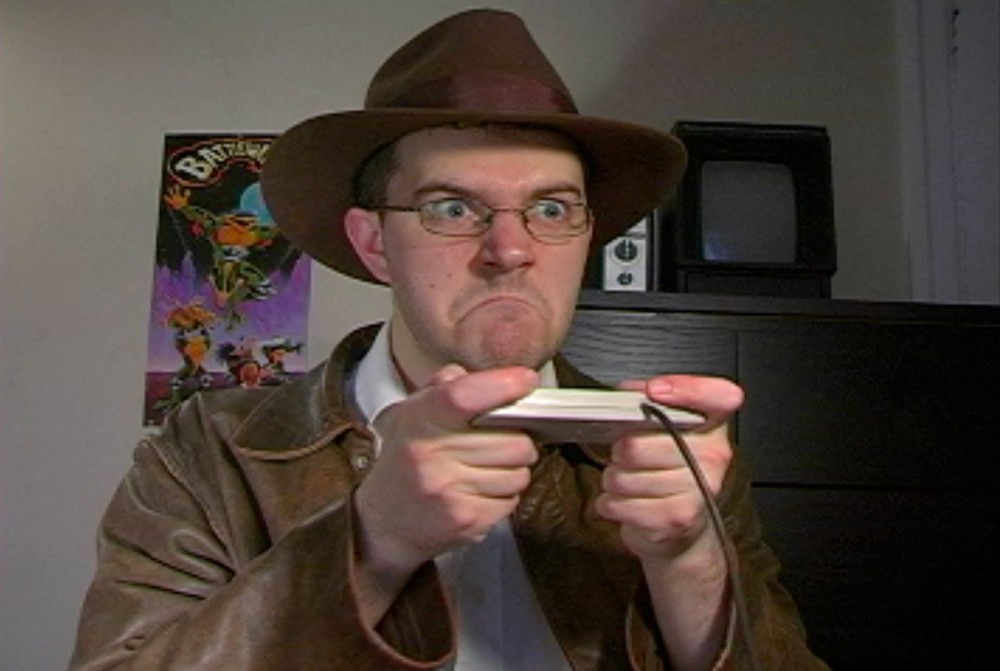Cliquez ici pour la version française.
Many of us here at Kinephanos were present at the international premiere of Angry Video Game Nerd: The Movie, screened during the Fantasia International Film Festival in Montreal on July 27th, 2014. The theater was packed with excited people.
The line outside the building was scary long. Inside the lobby, Fantasia Director of Operations Marie-Jade Lemonde had set up a play space with CRT TVs, a projector, and consoles. On display and available for playing were Howard Scott Warshaw’s E.T. the Extra-Terrestrial (1982) and Eric Ruth’s Angry Video Game (2010). This was a nice touch and I was – well, we were all – psyched to see the film come home in the video game cultural mecca of Montreal. I felt this moment was special, as if, somehow, for a short time the universe was not just lying there and making it all work, but was actively working it out to make it right. Ladies and gentlemen, start your favorite flashback cue…
I’m gonna take you back to my past…
I discovered the Angry Nintendo Nerd in 2006, when I happened upon a video promoted by screwattack.com. It was some nerd guy ranting on one of the few games I owned for the NES as a kid, one which I had played for years yet never succeeded in beating: Teenage Mutant Ninja Turtles. It was spot-on criticism of a frustrating game. That nerd went from one stupidly hard spot to another, going through my memories one by one, and putting words on those primal feelings I had kept buried in me for so long. The game player’s catharsis, the game designer’s hubris, everything was there.
He seemed to have tapped into a rich vein of shared memories with incisive acumen, deft editing, and of course, a propensity for vulgarity. This was my Primal Nerd Moment. Little did I know James Rolfe’s likable character would become what he is now – a 119-episode (as of now) thing, a cultural signifier, a voice to our collective childhood memories, and university classroom material. Yes, I actually put a few videos of the Angry Video Game Nerd in my video game history and aesthetics class. (That’s an advantage of teaching in French: no one gets seriously offended by vulgar speech in a second language! Y tu mama tambien!)

Typical student reactions. Our minor in game studies at the Université de Montréal actually gets a pretty good ratio of female students. …ok, maybe not *that* good.
Naturally, when Rolfe announced he was working on a feature-length film around the AVGN, I was ecstatic. I pledged $50 on Indiegogo.com, mainly because I wanted to support James as a filmmaker in achieving that goal since I figured he had given me, free of charge, dozens of hours of entertainment over the years. It seemed like a bargain. He was talented as well, as I had seen watching his horror shorts, movie reviews, Board James and Bullshit Man series. Plus, teaching screenwriting, I of course wanted a copy of the film script, which was the 50-bucks reward. Really fair deal to me. According to the AVGN Movie Timeline, the project was initially thought of by co-writers and directors James Rolfe and Kevin Finn in 2006, the script was completed in 2008, and rewrites lasted until December 2010. In my view, that’s where most of the film’s problems can be traced.
…to…watch a shitty movie that sucks ass?
Let’s make it clear: this is not a shitty movie, and it certainly doesn’t “suck”. But I’m not using that section title as clickbait either; I think the movie has some serious flaws and could, conceivably, garner such reactions. AVGN: The Movie is a fun and light movie, but not a great or grand movie. Yet the film keeps dancing on both feet, making you never quite sure of how to take it. It has simple yet effective comical replies, but then it features some heavy-handed sentimental-spiritual life lesson. It’s a hugely ambitious film with insufficient means to fulfill these wild aspirations, and it seems oblivious to that reality in its misdirected strive for epicness – as if featuring the car chase and explosion was the all-important end goal justifying any means to get there.
But a car chase that alternates between character reaction shots filmed in a van and a miniature car being pushed over a sand mound yields little interest when the final result appears rather like a disjointed montage of two scenes occurring in parallel. In the best case scenario, movies made with grand ambitions but relatively modest means can put up the face of grandness when it counts, hide behind a 2nd degree comedic downplaying when it’s absolutely impossible to deliver on the promises of grandeur, and step it back up to that epic scale when the time is right. AVGN: The Movie had all the right ingredients to do that as well, but instead just goes out full auto. Why?
From Jekyll & Hyde to the Nerd & Rolfe?
Keep your pants on, Rolfe fans (I am one!), I am not implying he’s a sinister and evil figure hyding underneath the Nerd’s likable surface. I see James Rolfe as a talented filmmaker who has proven he can master the palettes of horror and comedy. What I want to suggest is that the movie suffers from a conflict between Rolfe’s filmmaking ambitions and the origins and formula of the Nerd.
The AVGN Movie starts out focusing on the Nerd, his persona, his influence, and touches on many interesting aspects of fandom, internet celebrity, corporate overtaking of underground culture, and the paradoxical reality of playing and reviewing bad games. (No spoilers!) When the movie keeps there, Rolfe offers, as he does in his reviews, clever takes and insights on the games themselves, but also on the larger meaning and significance that they acquire in our gamer culture, and in the history of games. This is a kind of movie you can actually make for not too much money in a very convincing manner, focusing on everyday scenes and sets, dialogue, character development, and so on. Examples of this kind of work, which James has done very successfully in the past (albeit with more of a focus on comedy than we get to see in the film), can be seen in the AVGN episode 55 (Battletoads) and the Ninja training montage in episode 87 (Ninja Gaiden).
The movie progressively takes a turn and tries very hard to be a serious (ok, well “somewhat-serious”) action flick. If you deeply enjoyed the kind of thing that happens in the AVGN episode 46 on Super Mario Bros. 3, you might get your fill here. But in my opinion, what can work for a couple minutes here and there, as part of a short video that people watch privately on the internet, is not so much suitable for a full-length public theater release. Even then, I doubt I would watch the full film on Blu-Ray at home without tuning out or taking a bathroom break during some of the « budget action scenes ». I surprised myself drifting off in thought and losing focus for several seconds a couple times during some of these, in a theater jam-packed with vocal and reactive people. Rolfe’s traditional strength in tight editing is lost here amid a high number of seemingly unnecessary reaction shots and diverting scenes.
Fellow Kinephanauts were fairly quick in assessing that the film, clocking in at 115 minutes, was about 20 minutes too long. That’s a harsh statement, and I’m not sure it’s that bad, but I’m not ready to dismiss it outright either. The film does end up with way too many sets, characters, extras, and visual effects – to the extent that basic filmmaking conventions are haphazardly jumped over, and narrative pretenses are flunked left and right without much consideration, resulting in a film way more busy and confusing than it needs to be.

Don’t argue it’s “interesting and experimental and free from convention” until you’ve seen the film. That’d be like arguing that Final Fantasy VII’s English translation is all “interesting and experimental and free”. (Of course, it’s not THAT bad. But that’s not saying much.)
We get precious little of James’ candid acting, his exaggerated and contagious laughs, surprises, and frustrated faces; the Nerd we get to see in the movie seems stiff and wooden, too serious, and not as likable as we fans of the series have seen over the years. Which leads me to conclude this review with a question…
Is the Nerd really movie material?
When James Rolfe announced he was making an AVGN movie, I was ecstatic. Now that I’ve seen that movie, I’m asking myself one question: was it really a good idea at the core? I can’t fault James Rolfe for trying. Not everyone at Kinephanos was a Nerd fan like me. After seeing the film, I doubt they will have any interest in checking out the Nerd’s past catalogue of excellent, sharp and cognizant game reviews.
To me, the film revealed how ill-adapted the Nerd is for a traditional narrative movie format. The Nerd is a loner (« antisocial » gets thrown in once in the movie). His show is his alone, save for the occasional guests with whom he has limited interactions. Confined in the darkness of his lair and the wretched, worn games of a time long gone, the Nerd errs in a technological crypt where the ghosts of the past are met with profanity. Other people enter his lair for a time and then bide their farewell. The Nerd doesn’t interact with society – or at least, we don’t get to see it. He plays games and rants about them. He spurts comic one-liners and Rolfe places enough little jokes here and there to pepper things up. And he does it extremely well. When the Nerd steps out of his basement and embarks on a narrative quest with other people, all bets are off.
Maybe the Nerd isn’t the right vehicle for Rolfe’s filmmaking ambitions. At the end of the day, I feel like I’m interested in seeing Rolfe’s future works, whether as shorts or as a feature-length film (but I understand that means a few years’ wait, at least), but I am interested in spite of the AVGN movie, not because of it. I’m definitely interested in getting more Nerd episodes in the future – more so than waiting for a second Nerd movie. (In the Q&A after the film, co-writer and director Kevin Finn confirmed that if he and James were to do another movie soon, it would probably not be a Nerd movie, so that’s good news – to me at least.) And I have no interest in seeing this film again in any foreseeable future. It was an enjoyable, but sobering experience, rather than the laugh-out fun I’ve had in watching many Nerd episodes.
In contrast, and perhaps disconcertingly, a short film that was presented before the main feature hit closer to home. Each year, the Fantasia festival tasks a director with making a short film based on the current year’s selection. This year Jules Saulnier, who was present, told us he selected the AVGN movie as soon as he saw it listed because he was a fan and wanted to make his own AVGN episode as a tribute to Rolfe’s work. The resulting 8-minute short (featuring Alexandra Cyr, whom we had noticed during last year’s Fantasia festival as well) was extremely well-received, the audience bursting in laughter multiple times. I would really recommend checking it out (in Quebec French but with English captions).
So long, Nerd. I hope to see you again soon. I’m still a fan – just not a fan of your movie.
…And I’d like to conclude with a reminder. I still enjoyed the movie. I think it’s enjoyable for certain reasons, under certain terms. This review is hard, yes, but it is only that: a review. James Rolfe has given it all to do his movie, and this courage and resolve must be commended and saluted. When all is said and done, I still ascribe to Theodore Roosevelt’s speech of the Man in the Arena:
It is not the critic who counts; not the man who points out how the strong man stumbles, or where the doer of deeds could have done them better. The credit belongs to the man who is actually in the arena, whose face is marred by dust and sweat and blood; who strives valiantly; who errs, who comes short again and again, because there is no effort without error and shortcoming; but who does actually strive to do the deeds; who knows great enthusiasms, the great devotions; who spends himself in a worthy cause; who at the best knows in the end the triumph of high achievement, and who at the worst, if he fails, at least fails while daring greatly, so that his place shall never be with those cold and timid souls who neither know victory nor defeat.





